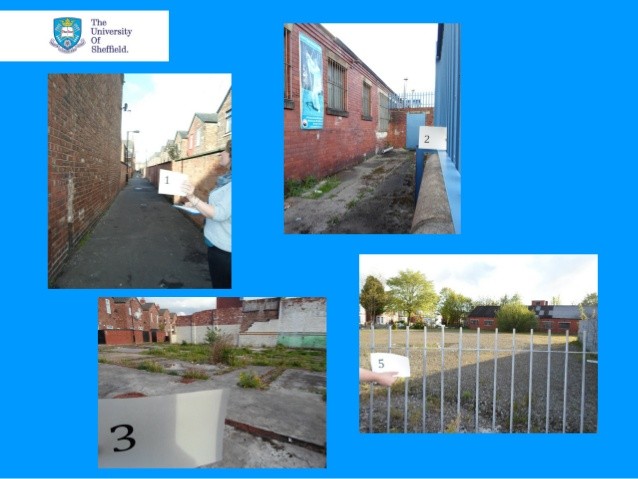Cultural Values of Digging
Post on: 16 Март, 2015 No Comment

By Penny Rivlin
On Saturday 8 th March, the team hosted a project event at the Friends Meeting House in Manchester. In a formal academic sense, project events provide an opportunity to publicly stage the ‘completion’ of the project – a moment to reflect upon, and share aspects of a research journey, its highlights and challenges, and ultimately present indications of findings to the academic community and other stakeholders. Whilst our event fundamentally conformed to this blueprint, it also evidenced the reciprocal and relational aspects of ‘doing’ a social research project. Here, I am referring to the investment and willingness of our diversely situated research respondents to share their stories – in this case, of ‘digging’ – with the academic community. But what became clear throughout the trajectory of the project is that our respondents’ perceived our project as a platform upon which they could communicate their digging-related experiences, aims and desires to wider constituencies than that of the ‘traditional’ researcher/researched relationship. All of our respondents are users and/or consumers of social media to varying extents; they blog, use Instagram, Audioboo, Flickr, Pinterest, and Youtube and comment on their digging stories across a range of time frames, from multiple daily, to weekly posts. They did not see their investments in our project as discrete, singular performances of self, but rather as connected, united selves in a common project, in which the cultural values of digging could be explored and disseminated via a ‘digital commons’. As such, we felt that our event should focus on our research participants, providing a space for collective engagement, connection and storytelling.
We invited all of our research participants and members of their projects, as well as other groups involved or interested in digging-related activities – that the event was fully subscribed is perhaps, in itself, a significant indicator of the circulation of cultural values of digging in the North West of England. Eleven of our fourteen case study respondents joined us; moreover, we were delighted that the event provided an opportunity to meet with other diggers from the Wigan Diggers’ and Moss Side Community Allotment projects. Of the team members co-hosting the event, the project’s Principal Investigator, Farida Vis has connections with all of the case study groups through her sustained investment in digging across a range of registers; co-investigators Erinma Ochu and Peter Jackson had connections with the wartime gardeners and Moss Side diggers respectively (due to other commitments, co-investigator Andrew Miles was unable to join us). In my role as Research Associate, I have been privileged to interview all the participants, so the event was a welcome opportunity to meet with them again, and for the team to meet, or re-connect with the diggers in person.
As a means of introducing and familiarizing the event collective with the aims and objectives of our research, Farida presented a slide-show and informal discussion of our case-studies,
The Cultural Values Team with artist Lyndsey
highlighting the affiliations, thematic connections and (dis)continuities between them. The diggers’ feedback suggested that the presentation enabled them to situate themselves both in the wider context of the research framework and in relation to the other case studies. This generated a sense of connectivity, and, as one digger commented, of ‘digger unity’.
Situating herself as an embodied digger as well as researcher, Farida concluded her talk with a gift offering to the event attendees. Drawing on the theme of ‘gifting’ and reciprocity that cross-cuts the case studies as evidence and expression of cultural value, Farida had prepared gift bags containing recently potted strawberry ‘Maxim’ plants raised at her allotment in Manchester. She also included a packet of ‘Daniel’s Borlotti Beans’ seeds, explaining that these were, in turn, gifted to her some years ago by an elderly man who digs a neighbouring allotment. Having successfully nurtured Daniel’s beans for ten years, Farida offered these seeds as a ‘Manchester hardy’ plant, noting that Daniel would be happy to know that his beans are thriving across various gardens and yards in the North West! This token of thanks appeared to be well received, even amongst the Wigan Diggers’ – none of whom engage in embodied digging activities (as yet!); their attachments to ‘digging’ being rooted in the historical-political symbolism of Wigan born Gerrard Winstanley, and his involvement with the 17 th century digger movement (see my earlier blogs on The Winstanley Festival for an overview).
mosssidecommunityallotment.wordpress.com ).
wigandiggersfestival.org attract international visitors, and the Oldham’s Facebook page converses with the international community).
www.flickr.com/photos/31020216@N04/13062355745/in/photostream/ .
As is the case with all social research projects, our own could not have proceeded without the investment and interest of our multiple research partners, and here, we wish to thank all stakeholders, but especially, the Wartime Gardeners, the Moss Side Community Allotment diggers and the Wigan Diggers’, for so generously giving of their time to our project.
Erinma and I would like to thank Marc and the other diggers at MSA for so generously giving of their time (and, delightfully, we were treated to tea, toast, and wonderful fresh laid eggs from the MSA hens), and for so warmly sharing their community digging stories with us.














